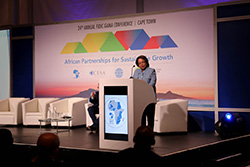 Cape Town Mayor Councillor Patricia de Lille says that partnerships are vital to achieving progress and believes that together, we can do great things and take the African continent to new heights by building on our past to create our own futures dynamic and vibrant African cities.
Cape Town Mayor Councillor Patricia de Lille says that partnerships are vital to achieving progress and believes that together, we can do great things and take the African continent to new heights by building on our past to create our own futures dynamic and vibrant African cities.
De Lille was delivering her keynote address during the FIDIC-GAMA 2017 Conference held at the Cape Town Convention Centre from the 07th to 10 May 2017.
“In our work of building an ‘Opportunity City’, we recognise the important role that our fellow African countries and cities play in bringing progress and economic growth for our continent. We firmly believe in the Africa rising narrative, that it is Africa’s time. Together, we have a wealth of unique experiences and expertise to become a major global player across various markets,†she explained.
She pointed out that the City of Cape Town has taken a decision to grow business opportunities between itself and African cities in line with its enhanced African Agenda to strengthen ties and facilitate mutually beneficial partnerships and investment opportunities.
“We have a clear bias towards Africa in our strategies to promote trade and investment and share ideas and best practice solutions with our counterparts across the continent. An integral part of this strategy is to increase Cape Town’s connectivity with the rest of Africa.â€
CESA President Lynne Pretorius outlined that the conference came at a time when the environment in which business is being conducted “extremely challengingâ€.
“South Africa has its own economic challenges currently, along with various social and political dynamics. These are all mirrored to some extent in the rest of Africa, as well as in the rest of the world, developed and developing countries alike. With global changes afoot, it is clear that the world as we know it, the consulting engineering environment is changing. Within this dynamic environment, CESA remains resilient and relevant in enabling Consulting Engineering Excellence in SA, the SADC bloc and further across our borders, added Pretorius.
GAMA President Elect Eng James N. Mwangi said that with the growing local content requirements in many African countries, partnerships are important in ensuring capacity building, skills development and transfer.
“We expect to see even greater competition in bids and greater focus on Africa by global firms. We further expect even better quality delivery especially for very large projects and projects requiring very specialized skills.
Partnerships will also help local firms not only build capacity but also embrace better management skills and processes, use of sophisticated software for engineering solutions and enhancement of integrity. We see a more active role of membership associations as references for firms looking for partnership, training of staff from the firms in an effort to enhance capacities and integrity. Associations also are expected to have their members sign codes of conduct and promote good corporate governance,†noted Mwangi.
He added that Membership Associations of the GAMA family have the potential to enhance partnerships between firms in Africa by sharing data on the members and encouraging regional forums for members to meet and engage on among other topics, opportunities in their countries/economic blocks.
FIDIC-GAMA 2017 Local Organising Committee Chairperson, Nyeleti Director and GAMA Honorary Secretary Abe Thela said that the vast opportunities that Africa presents for infrastructure development attracts consulting engineers from all over the world to the continent. More and more of these infrastructure projects are mega, some are built in one country and benefit another and others span across country borders. By their nature, these projects not only require intergovernmental partnerships but partnerships among consulting engineers to ensure their successful execution.
“So far we have seen more partnerships between consulting engineers from outside Africa and African firms than partnerships between African firms. Partnerships to facilitate infrastructure development across our borders are crucial to sustainable growth and development of the consulting engineering profession in Africa as well as in integrating our regions,†explained Thela
According to the African Development Bank, the infrastructure need of Sub-Saharan Africa exceeds $93 billion annually over the next 10 years. To date, less than half that amount is being provided thus leaving a financing gap of more than $50 billion to fill.
Thela stated that on the flip side of these opportunities there are challenges that must be dealt with to ensure sustainable infrastructure development in Africa. These challenges include amongst others, insufficient investment in infrastructure development, corporate governance failure in both the public and the private sectors and requirements designed to exclude African consulting engineers from projects implemented by the Development Finance Institutions (DFI). These requirements are perceived to favor consulting engineers of the country of origin of the DFI and often are supported by inappropriate procurement strategies.
Director of Strategic Business Development, Transport and Planning for Africa, at Royal HaskoningDHV, Manfred Uken mentioned that accessibility and mobility are some of the most fundamental pre-requisites of sustainable development and need focused attention in Africa. Similarly, African logistic costs are unacceptably high and a serious barrier to growth and development on the continent.
“The workshop on Connecting African Infrastructure to Ensure Sustainable Development and Growth provided some best practices on how cities and transport authorities are coming to grips with these very fundamental issues. Consulting Engineers are key players in conceptualising and implementing these initiatives and will need to embrace a more pro-active role in realising these ideals,†said Uken.
The conference culminated in the formulation of several key resolutions, namely to explore upfront project development opportunities between member firms, to actively encourage collaboration and networking amongst members firms from respective countries through celebrating success stories and sharing best practices and finally to enhance member association organisational capacity through encouraging regional co-operation initiatives.
